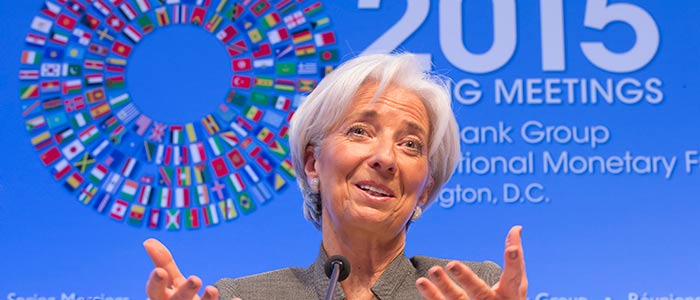WEb_IMF_ChristineLagarde_17169021875_5ac675797e_o.jpg

Christine Lagarde. Credit: IMF Staff Photo/Stephen Jaffe
The debt-stricken country is to see a third loan tranche worth €8.5bn ($9.5bn) released over the coming months, out of a total bailout amount of €86bn, meaning it can avoid default on debt repayments due in July.
Finally good news for Greece. It was well deserved.
— Donald Tusk (@eucopresident) 15 June 2017
Agreement on this stage of the bailout has been delayed since the end of last year as Athens, its European creditors and the IMF hit an impasse on how the programme should proceed, with disagreements over fiscal targets, debt relief and whether more austerity measures were needed.
While these have now largely been resolved, details around the remaining point of contention – debt relief – have been left relatively murky in order to secure agreement and prevent another Greek financial crisis this summer.
Announcing the deal yesterday, IMF managing director Christine Lagarde called this a “second best solution”.
However, she continued it is not a “bad one”: it avoids financial crisis; protects the reforms Greece has taken already; and realises “major progress” with regards to debt relief.
After sitting out of the programme since 2015, the fund has now agreed to the terms of the bailout and offered its participation “in principle”.
The fund’s financial contribution, worth $2bn, is conditional upon Greece’s European creditors committing to debt relief measures that the fund agrees can help make Greece’s debt pile, currently worth 180% of GDP, sustainable.
The fund’s refusal to participate had been a key sticking point in the negotiations, with some of Greece’s biggest European Union creditors, such as Germany, making IMF involvement a red line for continued loans.
Fund participation still needs to be confirmed by its executive board, however Lagarde is now recommending this on the basis that creditors have provided some more details on the instruments and range of debt relief measures already proposed last year.
The measures on the table include longer maturities, deferral of interest payments and an instrument that enables relief to be adjusted depending on the performance of the Greek economy.
Major step forward for #Greece today in #eurogroup: agreement on all elements. Now going into last year of financial support programme
— Jeroen Dijsselbloem (@J_Dijsselbloem) 15 June 2017
Jeroen Dijsselbloem, head of the Eurogroup of EU finance ministers, explained that the “exact calibration” of measures will not be decided until Greece completes the programme in 2018.
Also agreed yesterday were the fiscal targets Greece will have to adhere to under the bailout. There had been dispute about how long the country should have to maintain a surplus, excluding debt repayments, worth 3.5% of GDP – an impressive feat for any country.
It has now been decided this will continue until 2022.
Greek government spokesman Dimitris Tzanakopoulos said that Athens had gotten “what it wanted” – clear commitments on debt, growth and a clear path to exiting the programme in 2018.
Σήμερα η Ελλάδα γυρίζει σελίδα. Έχουμε μια συμφωνία που ανταποκρίνεται στις θυσίες του ελληνικού λαού. (1/2)
— Prime Minister GR (@PrimeministerGR) June 15, 2017
Χθες έγινε ένα καθοριστικό βήμα για την έξοδο από την κρίση. Ενημέρωση του ΠτΔ για την συμφωνία στο #Eurogroup. https://t.co/d03HF1lIHX
— Prime Minister GR (@PrimeministerGR) June 16, 2017
The country’s prime minister, Alexis Tsipras, who heads the leftist Syrizia party, said on Twitter that the agreement turns the page for Greece and marks a “decisive step for the exit from the crisis”.
Former Greek finance minister and left-wing commentator, Yanis Varoufakis, however, said the surplus target will require an “insane level of austerity”.
Yesterday's Eurogroup statement reminded me of how nothing has changed, or will change, until Athens learns to say NO (and mean it) pic.twitter.com/YRfgAUAp9Y
— Yanis Varoufakis (@yanisvaroufakis) 16 June 2017
Greece, now on its third such bailout, has already endured years of harsh measures to cut spending and raise taxes, even as the economy shrunk and people lost their jobs.
According to a study by Greek NGO Dianeosis, poverty had risen to 15% in 2015, compared to 2.2% in 2009. Today, the country still has the highest unemployment in Europe.
Sarah-Jayne Clifton, director of the Jubilee Debt Campaign, said the IMF will have lost its leverage to push for debt relief by endorsing an “unjust, failing deal”.
“Wages, pensions and public services have already been cut to the bone,” she said. “Debt cancellation is the only way out of this debt-austerity trap.”
Yesterday’s agreement doesn’t contain any further austerity measures, although Greece had already had to legislate more pensions and tax reforms worth 2% of GDP in May in order to secure it. It does however call for some revenue-neutral measures targeted at enhancing growth.
Klaus Regling, chief executive of the European Stability Mechanism, which disburses the loans, explained the latest tranche will leave Greece in a financially sound position until the end of the year.
However, its full release will be dependent on Athens implementing the policies agreed during the negotiations, and contributing some of its own resources towards clearing arrears.
Greece’s fiscal position – excluding debt repayments – had overshot expectations earlier this year, finally leaving the country with some fiscal space.
Growth projections, too, had been optimistic. However prolonged wrangling between the bailout’s different parties took its toll, and the country slipped back into recession at the start of this year.













